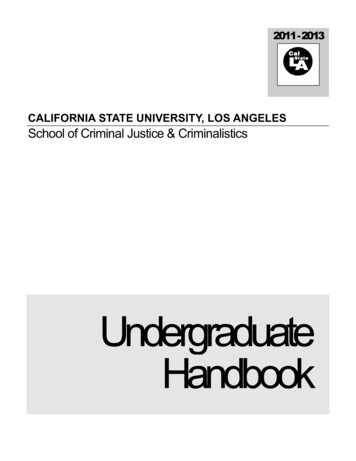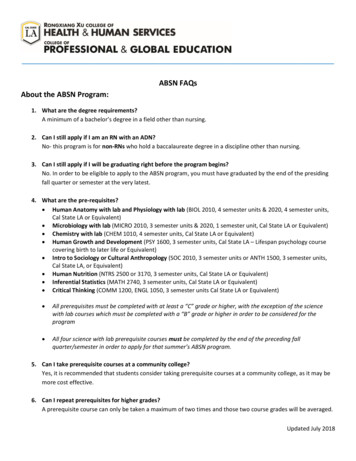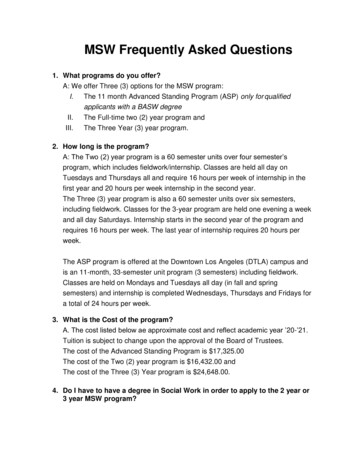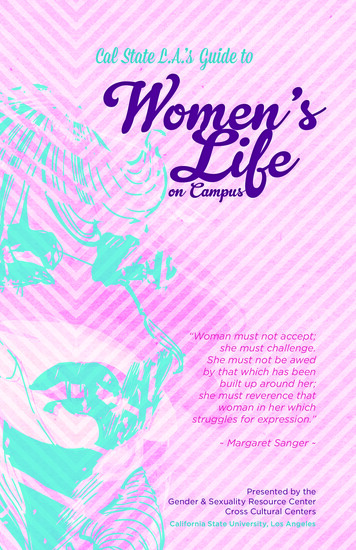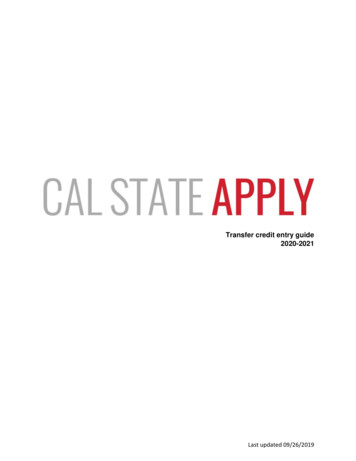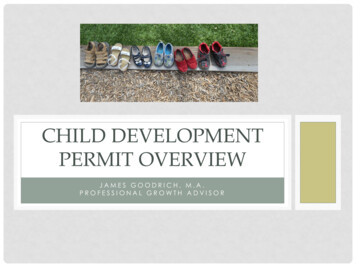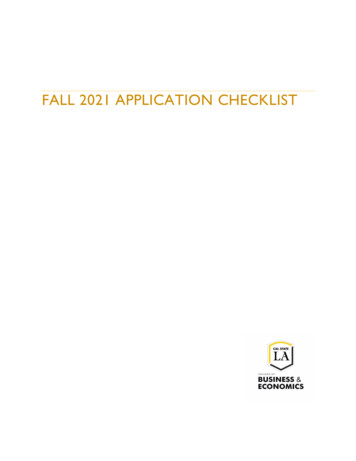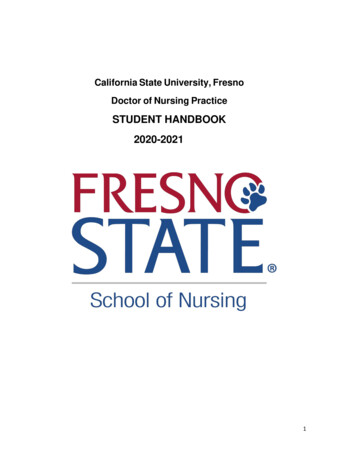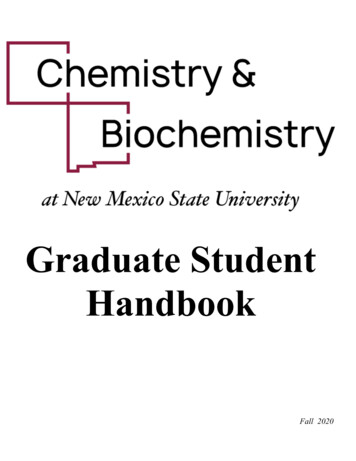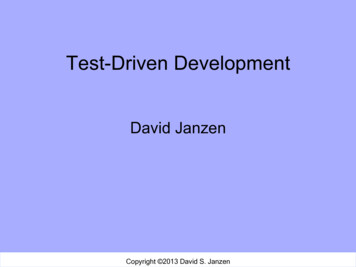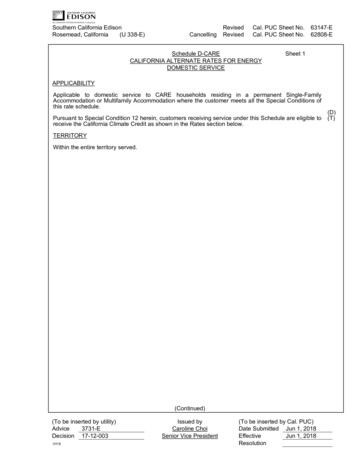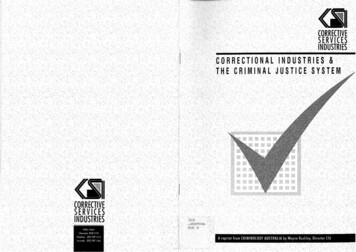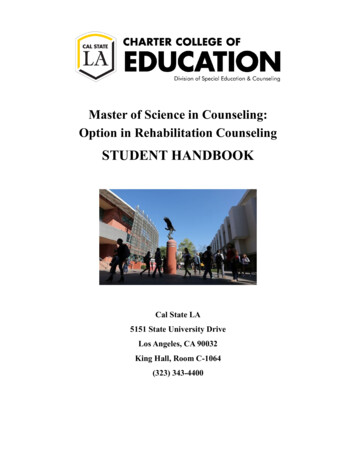
Transcription
Master of Science in Counseling:Option in Rehabilitation CounselingSTUDENT HANDBOOKCal State LA5151 State University DriveLos Angeles, CA 90032King Hall, Room C-1064(323) 343-4400
Table of ContentsOur WebsiteIntroduction to Our ProgramAccreditationMission Statement and Program ObjectivesThe Rehabilitation Counseling ProfessionCal State LA Master of Science in Counseling Program StructureStudent Recruitment, Eligibility for Application and AdmissionExpectation of StudentsStudent ConductServices for Students with DisabilitiesPersonal Counseling Services for StudentsCompetency with TechnologyStudent Retention, Remediation, and DismissalNew Student OrientationStudent AdvisementResponsibility of StudentsResponsibility of AdvisorsStudent RetentionPolicy for Student RecommendationsStudent Remediation and DismissalAcademic Appeal PolicyProfessional OrganizationsMatriculation RequirementsCertificate ProgramsBrief Description of CoursesRoadmap for Three Years of Full-time StudyOctober 31, 20192
Certification and LicensureCertified Rehabilitation Counselor (CRC)Licensed Professional Clinical Counselor (LPCC)Continuous and Systematic Program Evaluation and Student Assessment PlanCACREP Vital Statistics DataProgram FacultyOctober 31, 20193
Master of Science in Counseling,Option in Rehabilitation CounselingThis Student Handbook follows CACREP standard 1.N: The student handbook includes (1) themission statement of the academic unit and program objectives, (2) information aboutprofessional counseling organizations, opportunities for professional involvement, and activitiesappropriate for students, (3) matriculation requirements, (4) expectations of students, (5)academic appeal policy, (6) written endorsement policy explaining the procedures forrecommending students for credentialing and employment, and (7) policy for student retention,remediation, and dismissal from the program.PLEASE NOTE: Additional important information is contained in (a) the Cal State LA University Catalog athttp://ecatalog.calstatela.edu/index.phpand (b) the Graduate Student Handbook 2018-2019, and for future updates point your browser to the Office ofGraduate Studies website athttp://www.calstatela.edu/graduatestudiesThese important regulations and procedures are not given duplicate coverage here. The supervised practice portionof the program is discussed in detail in the Supervision Handbook.Our WebsiteYou will also find much of the information within this Student Manual posted /ms rehabwhere we list the core counselor education program faculty, the program related certificates,including admissions criteria, accreditation status, methods of instruction, minimum degreerequirements, matriculation requirements, and financial aid information. CACREP Standard 1.BIntroduction to Our ProgramThe Master of Science in Counseling, Option in Rehabilitation Counseling program at Cal StateLA, prepares aspiring rehabilitation counselors for careers that assist people with disabilities tolive fulfilling lives. The curriculum uses a holistic approach to address the medical,psychological, and social aspects of disability.The program admits 36 students each fall for full-time graduate study and currently has two fulltime faculty and six adjunct faculty members. The 70-semester-unit program requires three yearsto complete, has a near perfect graduation rate, and prepares counseling professionals for auniquely qualified scope of work. Many of our students have job offers prior to completing theirgraduate program. Graduates go on to work in a wide range of rehabilitation-related settings withcompetitive wages and opportunities for advancement.October 31, 20194
AccreditationThe Western Association of Schools and Colleges (WASC) accredits Cal State LA. The Masterof Science in Counseling program is accredited by the Council for Accreditation of Counselingand Related Educational Programs (CACREP). Research suggests CACREP graduates performbetter on certification examinations, an important measure of student success. CACREPaccreditation is the recognized training standard for counselors by the Institute of Medicine andthe Veterans Administration, allowing our students access to competitive employmentopportunities. CACREP-accredited curricula are consistent with state counselor licensure lawsincluding California, affording a pathway for our students to licensure and portability of thatlicense.Mission Statement and Program ObjectivesCACREP Standard 1.N., the mission statement of the academic unit and program objectivesMissionThe mission of the Master of Science in Counseling, Option in Rehabilitation CounselingProgram is to recruit, retain, and graduate students from a remarkably diverse urban center tobecome rehabilitation counselors prepared to perform the full scope of practice of the profession.The Program creates a learning environment that creates a professional rehabilitation counseloridentity. Graduates will be qualified to provide the full scope of rehabilitation counseling-relatedservices to individuals who have disabilities in order to maximize their personal and professionalpotential. Program faculty systematically evaluate and improve the program based on studentand community stakeholder feedback on the following program objectives:1. Recruit applicants from a remarkably diverse urban centera. Distribute program brochures via e-mailb. Enhance our web presencec. Present on the program to relevant organizations, agencies, classes at Cal StateL.A., and other colleges and universitiesd. Networking with employers at practicum and internship sites2. Retain enrolled master’s studentsa. Encourage participation in the student Rehabilitation Counseling Association andother rehabilitation-related state and national organizations to further developtheir professional identityb. Provide accurate, timely, and effective advisement throughout the academic yearc. Help students remedy academic difficulties3. Deliver the CACREP-accredited curriculum in rehabilitation counselinga. Students will be oriented to the roles and functions of specialty areas incounseling and related ethical, legal, and professional issues (COUN 5001, 2.F.1)b. Students will recognize the richness and uniqueness of socially and culturallydiverse populations, providing equitable services to all individuals (COUN 5103,2.F.2)October 31, 20195
c. Students will be able to recognize consumers’ strengths and capabilitiesthroughout their lifespan (COUN 5000, 2.F.3)d. Students will establish their knowledge and expertise in career development, theworld of work, and the vocational implications of disability, including theknowledge to assist with issues of accommodation and accessibility (COUN5140, 5149, 2.F.4)e. Students will develop effective individual counseling strategies (COUN 5005,5114, 2.F.5)f. Students will develop effective group counseling strategies (COUN 5160, 2.F.6)g. Students will be able to select, administer, score, and interpret commonassessments in counseling (COUN 5002, 2.F.7)h. Students will be able to appropriately evaluate the effectiveness of interventionsand programs (COUN 5003, 2.F.8)i. Students will obtain practical experiences in working with people with disabilitiesin community, public, private sector agencies, and colleges and universitieswithin an urban environment (COUN 5187, 5188, Section 3)j. Students will promote the dignity and worth of all individuals, and advocate forpeople with disabilities so that they receive maximum benefit and equitabletreatment in society (COUN 5103, 5140, 5149, 5.H)k. Students will identify the medical and psychosocial aspects of a wide range ofdisabilities (COUN 5111, 5142, 5143, 5.H.2.b, c, d, e)l. Students will be able to conceptualize an individual’s functioning, disability, andhealth and develop a related program of treatment (COUN 5111, 5142, 5143,5.H.2.b, c, d, e)4. Graduate and place 100% of enrolled students.a. Share with students and graduates job postings on our websiteb. Follow-up on and document alumni employmentc. Follow-up on CRCC exam resultsd. For students pursuing counselor licensure, follow-up on post-master's supervisedhours, State Ethics and Law exam, and performance on the NCMHCE.d. After two-years of employment, create supervised practice opportunities forfuture studentsThe Rehabilitation Counseling ProfessionRehabilitation counseling is a systematic process which assists persons with physical,mental, developmental, cognitive, and emotional disabilities to achieve their personal,career, and independent living goals in the most integrated setting possible through theapplication of the counseling process.The counseling process involves communication, goal setting, and beneficial growth orchange through self-advocacy, psychological, vocational, social, and behavioralinterventions. The specific techniques and modalities utilized within this rehabilitationcounseling process may include, but are not limited to: Assessment and appraisalOctober 31, 20196
Diagnosis and treatment planningCareer (vocational) counselingIndividual and group counseling treatment interventions focused onfacilitating adjustments to the medical and psychosocial impact of disabilityCase management, referral, and service coordinationProgram evaluation and researchInterventions to remove environmental, employment, and attitudinal barriersConsultation services among multiple parties and regulatory systemsJob analysis, job development, and placement services, including assistancewith employment and job accommodationsThe provision of consultation about, and access to, rehabilitation technologyThe official statement of the Commission on Rehabilitation Counselor Certification (CRCC, 1994, pp. 1-2), as cited in Tarvydas & Hartley (2018).As graduates from the Master of Science degree in Counseling, Option in RehabilitationCounseling, one may find work in a variety of settings: Assisted and Independent Living FacilityCommunity College or UniversityCommunity Rehabilitation CenterCorrectional/Detention Center or PrisonDisability Management/Insurance CompanyEmployee Assistance ProgramForensic Rehabilitation SettingHospital: Traditional, psychiatric, or RehabilitationNon-Profit Rehabilitation Agency (Easter Seals, Goodwill, Jewish VocationalServices, United Cerebral Palsy)Private PracticeSecondary SchoolSenior Citizen CenterSkilled Nursing FacilitySocial and Human Services OfficeUnemployment/Employment Services OfficeVeterans Affairs DepartmentWorkforce Development CenterYouth Guidance OrganizationGraduates may hold a variety of positions: Career/Vocational CounselorCase ManagerCertified Rehabilitation Counselor (CRC)College Career Planning CounselorInstructorCoordinator for Student Disability ServicesEmployment OfficerOctober 31, 20197
Grant AdministratorLife Care PlannerLong-term Disability SpecialistMental Health/Clinical Counselor (Licensed Professional Clinical Counselor,LPCC)Rehabilitation Agency DirectorResearcherResidence CounselorState Vocational Rehabilitation Counselor (Qualified RehabilitationProfessional, QRP)State Vocational Rehabilitation Team LeaderSubstance Use/Addictions CounselorTesting Specialist/Vocational EvaluatorTransition Services in Secondary SchoolsVeterans Affairs Vocational Rehabilitation CounselorVocational Expert in Forensic Rehabilitation CounselingBureau of Labor Statistics 2018, Largest Employers of Rehabilitation Counselors: Community and vocational rehabilitation services: 30%Individual and family services: 18%State government, excluding education and hospitals: 13%Nursing and residential care facilities: 12%Self-employed workers: 8%Job outlook for 2018-202810% growth which is faster than average, resulting in over 11,800 new positionsCal State LA Master of Science in Counseling Program StructureThe Option in Rehabilitation Counseling is one of four graduate-level counselor educationprograms housed in the Division of Special Education and Counseling within the CharterCollege of Education. The other three programs are Applied Behavior Analysis, School-BasedFamily Counseling, and School Psychology. The division also offers a B. S. degree inRehabilitation Services, and a Minor in Rehabilitation Services.Student Recruitment, Eligibility for Application and AdmissionCACREP Standard 1.L.1-4CSULA and the MS in Counseling, Option in Rehabilitation Counseling Program serve theculturally and linguistically diverse population of the urban community that is Los Angeles andthe surrounding area. The program recruits qualified individuals with strong interests in workingOctober 31, 20198
with people who have disabilities. It is the philosophy of the program to include in recruitmentefforts persons with disabilities and individuals from culturally diverse backgrounds.Applicants to the program must meet the academic requirements for Classified GraduateStanding described in the Cal State LA General Catalog. Additional requirements are discussedin the Student Advisement Handbook for Master’s Degree Programs.Entry into the Option in Rehabilitation Counseling involves two separate admissions processes.First, the Cal State LA Graduate Admissions Office requires (a) a completed application form,(b) official transcripts of all college and university work, and (c) an application fee. The onlineapplication is available through Cal State Apply on the Cal State LA website. The GeneralCatalog and each semester’s Schedule of Classes discuss details such as the number of copies oftranscripts, deadline dates, and the application fee. Inquiries concerning the general Cal Stateadmissions process should be addressed to the Admissions Office.In addition, the MS in Counseling, Option in Rehabilitation Counseling requires a separateapplication form, official transcripts, two letters of reference, and a personal interview. Theapplication is to be completed and submitted online. All of this information can be found at thefollowing link: s rehabApplications are due by January 15 of the year for which the student is applying. When theCharter College of Education has received an applicant's completed application form, transcripts,and reference letters, the applicant file is defined as "complete," an admissions interview may bescheduled. Among other qualifications, applicants are expected to have (a) experience (paidwork, volunteer work, other life experiences) which provides a sound basis for choosing a careerworking with people; (b) sufficient knowledge about the work of rehabilitation counselors toprovide a reasonable basis for choosing to undertake training in this work; and (c) skill atrecognizing and responding to the ideas and feelings expressed by other people. These issueswill be evaluated through the application form and interview. Upon completion of interviews,applicants will be notified by e-mail concerning their admission.Expectations of StudentsCACREP Standard 1.N.4, expectations of studentsStudents are expected to review this Student Manual, the Supervision Manual, and all Cal StateLA-related policies and procedures reviewed in all syllabi.Student ConductThe Charter College of Education faculty members assume that all students will conductthemselves as mature citizens of the campus community and will conduct themselves in amanner congruent with university policies and regulations. Inappropriate conduct is subject todiscipline as provided for in Title 5, California Code of Regulations (see Student Conduct:Rights and Responsibilities, and Student Discipline, Cal State LA onductOctober 31, 20199
Academic honesty is expected of all students in the Charter College, in accordance withUniversity policy. There are established university reporting procedures if a student is suspectedof committing an academically dishonest act.Also, information on student rights and responsibilities, academic honesty, standards of conduct,etc., can be found in Schedule of Classes for the current semester visit the Cal State LASchedule of Classes Information under Policies and Procedures.Other questions about university policies on student and academic support can be answered atthe following Web portals:Information on Cal State LA student support resources for students: Student ServicesInformation on CSULA academic support resources for students: Academic SupportInformation for students on how to be a successful online student and how to use Canvas:Canvas Community.Services for Students with DisabilitiesStudents are responsible for registering with the Office for Students with Disabilities if theyrequire reasonable accommodations. For more information visit the Office for Students withDisabilities home page al Counseling Services for StudentsCACREP Standard 1.H, The institution provides information to students in the program aboutpersonal counseling services provided by professionals other than counselor educationprogram faculty and students.Counseling and Psychological Services (CAPS) provides confidential and non-judgmental helpwith your personal growth and psychological wellness. CAPS specializes in mental healthservices which can help you express thoughts and feelings, gain perspective, alleviate emotionalsymptoms, improve coping skills, and make healthy changes in your /capsCompetency with TechnologyCourses in the Charter College of Education (CCOE) require a high level oftechnological literacy along with access to current technology in order to assure studentsuccess. In all undergraduate, credential, certificate, and graduate courses, students inthe CCOE are expected to: Have access to an internet accessible device that will meet the technologyrequirements of the course in which the student is enrolled.Have sufficient working knowledge of this device, its applications and operatingsystem to use it for their classes, as well s how to keep its operating system andapplication up-to-date.October 31, 201910
Use a Cal State LA email account for all course and university-relatedcommunication.Access the current campus learning management system (e.g. Canvas) on aregular basis as required by the course in which they are enrolled.Use campus technology resources including the Cal State LA portal, OpenAccess labs and ITS Help Desk as needed: the ITS Helpdesk StudentResources page. Information on CSULA technical support resources forstudents: Technical SupportStudents should anticipate that their use of these skills will be integrated into courseswithin their programs. Students who are unable to meet any of the above expectationsare strongly advised to take an introductory technology course or ITS workshop uponenrollment in the Charter College of EducationStudent Advisement, Retention, Remediation, and DismissalCACREP Standard 1.O, policy consistent with institutional due process policies and with thecounseling profession’s ethical codes and standards of practice.New Student OrientationCACREP Standard 1.MPrior to fall semester, typically mid-May, the program provides a new student orientation duringwhich this Student Manual is disseminated and discussed, students’ ethical and professionalobligations and personal growth expectations as counselors-in-training are explained, andeligibility for licensure/certification is reviewed.Student AdvisementCACREP Standard 1.PStudents in the Option in Rehabilitation Counseling are advised based on the first letter of theirlast name, distribution among faculty will be determined at the beginning of the student’sprogram. In addition, students can refer to the Charter College of Education Student AdvisementHandbook for Master’s Degree Programs for information on graduate advisement.A stude
Veterans Affairs Vocational Rehabilitation Counselor Vocational Expert in Forensic Rehabilitation Counseling Bureau of Labor Statistics 2018, Largest Employers of Rehabilitation Counselors: Community and vocational rehabilit
